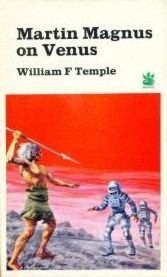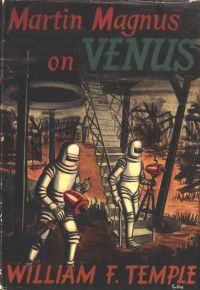William F. Temple's Martin Magnus series
Or 'The Great Magnus Hunt'
For information on the Kindle editions of these books, click here.
I encountered the first book in the Martin Magnus series in the late seventies. Titled
Martin Magnus, Planet Rover, it was a Mayflower paperback, a Green Dragon title with the ominous words 'for older boys and girls' on the back cover. I was seven or eight at the time, so I put it aside until I was qualified to read such a weighty tome. Plus, to someone still reading Swallows & Amazons, Famous Five and Just William with wide-eyed excitement, that hairy monster on the cover looked
scary. (I do remember wondering where 'Planet Rover' was. Later, a lot later, I discovered it meant he roved from one planet to the next.)

I was about 11 or 12 when I finally read the book. By this time my family had shifted to Spain, so real life was already pretty exciting. Books had to be extra special to compete with a new culture, a new language and a new school. This was also my first taste of Science Fiction, and many have waded into lurid-looking books only to founder on dry technical details. However, this was different: the heady combination of outer space, life-or-death adventure and intelligent, scientific characters made the Famous Five and Just William look as believable as a Punch and Judy show. Martin Magnus wasn't space battles or Zap! Kerpow! sci-fi, it was about a troubleshooter who could be driving a six-wheeled buggy over rugged Moon terrain in chapter two, strolling the ocean floor in chapter four and flying to Venus by chapter seven. He was competent, confident, wilful, allergic to bureacracy and interference from his 'betters' and intolerant of pompous, self-important twits. To a 12-year-old schoolboy suffering in the Spanish school system, he was a hero.
After reading the book several times in a row, I realised there was another book by the same author (it was mentioned amongst the publisher guff in the front of 'Planet Rover', but who reads the pages before 'Chapter One'?) Apparently, the sequel was called 'Martin Magnus on Venus'. Now, we'd been living in Spain for two or three years by now, and I'd seen ONE Spanish novel in the eight years I lived in that country. That was an Isaac Asimov translation which someone gave me for a birthday present. We didn't even have a telly, with only one channel of dubbed John Wayne movies it wasn't worth it. And don't ask me what everyone did in their spare time... Although I did notice a tendency for large families amongst the locals.
Anyway, ex-pats ran the occasional jumble sale or flea market. These were rare, probably because the Guardia Civil (policemen with machine-guns, jackboots, steel helmets and attitude) were convinced they were hotbeds of stolen gear. All right, so one year a couple of crooks cut down a vanload of baby pines from a plantation and tried to sell them as 'Christmas Trees', but most of the stuff was plain old junk. They didn't sell any, by the way - It wasn't that the guys were crooked (everyone was, I think), but the 'Christmas Trees' came complete with white silken pods the size of oranges, stuffed with writhing black caterpillars.
The point is, with the limited shopping options at my disposal I had as much chance of getting hold of a particular book as I did of flying to the Moon.
Four or five years later, just before we left Spain, I attended a small fete at a remote school. It was about 15 km from home, practically another country in that part of the world, and while there were no Christmas trees (it was June) or patrolling Guardia Civil (too hot), they did have a book stall. As I was browsing the lurid contents of one particular box, a familiar red-and-white cover leapt out and smacked me right between the eyes:

Found it! I dug out my spare cash and moments later the book was mine. I swear I'd finished it by the time we'd driven the 15km back home, at which time I probably read it another three or four times just to memorise the bits I hadn't already got clear. Then, no doubt, I would have read the first one again for the complete experience. My collection was complete. Bliss!
Fast-forward 15 years or so, to the year 2001. I was now living in Australia, having emigrated with my parents in 1983. By 1995 I was working on my first novel, part of a planned series about a wilful space pilot, a man allergic to bureacracy and interference from his 'betters' and intolerant of pompous, self-important twits. He wasn't a Magnus clone, though - Hal Spacejock is totally incompetent. I like to feel Hal's attitude towards tiresome rules and regulations would allow him to share a beer with Magnus at the local without coming to blows.
Back to Magnus. Of the 400+ books I managed to scrape together during my seven or eight years in Spain, thanks to weight limits and a suitcase the size of a school lunch box I was only able to bring a couple of books with me to Australia. I still have them - and no prizes for guessing which I chose.
Anyway, whilst browsing the internet one afternoon I decided to look up William F. Temple, to see what else he'd written. The Magnus books were great ... what if he'd written dozens of other novels for me to track down? I found a few titles, then stopped. Can you imagine my slack-jawed surprise when I discovered there was a third book in the Martin Magnus series? There it was on the screen: 'Martin Magnus on Mars' I checked both my Mayflower Magnus books, but neither of them said a peep about Mars. The covers didn't have subtle hints like 'Book Two in the Martin Magnus trilogy' or 'Look out for part three, coming soon!' Puzzled, I returned to my computer, where I discovered that the Magnus books were originally written in the 1950's, and that Mayflower had only bothered to reprint the first two in the series. There's a special place in hell reserved for the penny-pinching bastards who dreamt up that little twist, I can tell you. Where would the Lord of the Rings be if they'd dropped the third book? Who could possibly have enjoyed the 'Matrix' films if they hadn't made the third one? Ok, bad example.
Actually, I can understand their motives. When it comes to printing books, no publisher wants to lose their profit on warehouses full of unsold copies. Therefore, they release the first in the series and watch the figures. When they release the second, they print a quantity equal to however many sold of the first (in rough figures). So, if they print 5000 copies of book 1, and it sells 2000 (with 3000 remaindered or pulped), they print 1500-2000 of book two. It's logical really, you're unlikely to get more people buying book two than bought book one, and if you factor in all the people who bought book one and thought it stank you can see that you'll need less of book two than you did of book one.
Now, what happens if you only sell 500 copies of book two? You go ahead and print 300-500 copies of book three, right? Wrong! You don't print book three at all, because it's not worth printing less than a thousand copies of anything. Thus, you right royally annoy the 500 people who are avidly following the series, but you hope they'll switch to Dr Who or Star Wars tie-ins instead. So, that's my guess on what happened with the Mayflower 'Magnus' books. I have doubts, though, since the two titles they
did publish refer to each other and not Mars. They were also published in the same year, 1970, which wouldn't have given them time to guage the sales of the first book before releasing the second. OK, on second thoughts the publishers WERE a pack of penny-pinching bastards.
So, planned or not, Mayflower didn't print book three in the series. I thought I faced a tough task looking for book two in a part of the world where books were something you only read in school, and only if the village store remembered to order textbooks that decade. Now I faced something far worse - tracking down a hardback first edition of 'Martin Magnus on Mars', a book printed in the UK in 1956, which quite probably never made it to Australia. Once again I resigned myself to failure. Ironically, I'd been back to England in 1999 for only the second time since leaving Spain in 1983 - had I known about 'Mars' I could have spent an even bigger slab of my holidays in second hand bookshops. (I bought so many books on that trip I resorted to wrapping them in brown paper and posting them back surface mail, in blocks of 4. Interestingly, they were all waiting for me when I got home. Despite only paying for surface mail, they'd sent them airmail by mistake. The person who had been putting aside my mail was a bit miffed when I caught up with them, on account of the unending steam of plain brown parcels which had been arriving on their doorstep.)
Enter eBay, the perfect tool for hopeless nostalgics and avid collectors of obscure stuff nobody else wants. In those days you could set up three searches which would automatically email you when someone listed matching items. (Nowadays it's 100 searches. They're taking all the fun out of it.) I put in several combinations of William F. Temple, Martin Magnus and Mars, and pretty soon I discovered that everyone else only had the first two books as well. I did manage to pick up 1950's first editions of Planet Rover and Venus, as a kind of consolation prize, but Mars remained as unattainable to me as it did to the ancient Greeks.


If you're still reading this far into the page, I've probably got you to the end. So, I'm going to digress for a moment and discuss the original covers. First, check out the cover for 'Planet Rover' Call me unfair if you will, but that cover screams 'Biggles with ray guns' to me. Magnus, the lantern-jawed hero (never described as such in the text, you understand), is wearing a WWII battle-dress, with epaulettes and a row of campaign ribbons. He's wearing a pair of goddam army-issue binoculars, for gawd's sake, and that rare and exotic Venusian palm tree wouldn't look out of place in a Tarzan comic. Yes, it's 50's SF to the core. Trouble is, that's so far removed from the content it's not funny. Let me quote a couple of passages from the book. First, Magnus has been called in to examine a 'faulty' radar console, which is showing twin images of an unmanned rocket returning from Venus. He claims he knows nothing about the machine, until they ask him nicely. Then...
Magnus appeared now to be thrusting his thin face, with its narrow brown eyes and narrow beak of a nose, into every corner of the console, scanning the meters and peering through inspection ports. His bony, large-jointed fingers did a sort of skeleton dance over the switches, knobs, buttons and levers. For a man that knew nothing about radar trackers, he conveyed a surprisingly convincing impression of knowing just what he was doing.
Chief Radar Engineer Jenkins watched with lively interest. He knew all the trouble-shooting tests the makers had listed in the maintenance book for the equipment. Now he saw them run through at twice the speed he could do them, and another series of tests begin which were not in the book.
Magnus began humming in a tuneless way the doleful "Vecchia Zimarra" from Boheme, though probably no one, in or out of the opera house, would have recognised it. A corncrake might have responded, under the impression that its mate was calling.
I'm telling you, this is beautiful stuff. Tweaking the nose of the authorities while humming opera badly. Fantastic. And Temple plays the anti-war card, too, while explaining the creation of the Special Investigation Department, a kind of UN with balls:
But everyone needed to eat, and that had become increasingly difficult when the world's resources in brain, labour and material were being wasted in preparation for wars of the old murderous kind. In the end, even generals came to learn that they couldn't have roast beef on Sunday if they'd bombed the cattle on Saturday. The real battle was not against each other, but alongside each other - for survival. (So why does the cover artist depict Martin Magnus in army uniform?)
Compare the original 'Rover' cover to the 70's version at the top of the page. It's the same scene... things changed a lot in 16 years, didn't they? Now for 'Venus' - it took a real visionary to design a spacesuit out of sheet metal, and it's just as well they're not red or aliens might have tried to post their mail through the eye slots. Those tripod things are disrupters, they're designed to suppress the warlike natives. Pity they're powered with a hand-crank.
Now that I knew of
Martin Magnus on Mars, I discovered several new ways to not find a copy. I discovered ABEBOOKS and set up more searches (loads of
Martin Magnus on Venus and
Planet Rover, not a Mars to be seen). I got daily emails with new listings for all kinds of William F. Temple stuff, from fanzines to short stories to cheap US reprints with two William Temple novels printed back-to-back. But no Mars.
For 3 or 4 years I've been looking out for that book. A couple of years ago I ordered a William Temple bibliography by Mike Ashley in the hope that it would summarise the plot (It contained one sentence on the book, explaining that Martin Magnus visits Mars. I was crushed.) I emailed Mike and discovered that he knew of a copy, but it belonged to William Temple's widow. I searched the web and found out the British Library had a copy, which was as good as saying there was one aboard a space station orbiting Jupiter. (Although, had I known it was there in 1999 I might have nicked it - and still been in jail now. They allow you reading material in jail, don't they?)
I got nothing back from the usually reliable eBay. Either nobody has a copy, nobody wants to sell their copy, or nobody thinks it's worth listing an outdated, unknown old SF novel. So, plenty of the first two books but none of the third.
All good searches come to an end, and I can now reveal the final chapter. In the past year I've been using Mozilla Firefox, and I want to explain how using this browser found my copy of Martin Magnus on Mars.
Firefox, like Internet Explorer, lets you create folders in the bookmarks toolbar. Clicking one of these folders shows the favourites stored in that folder as a drop-down list. I keep one for 'Check Daily', another for 'Check Often', and several others for my frequently visited sites. In Firefox, unlike Internet Explorer, there's an additional entry at the foot of every list: 'Open in Tabs'. When you click this, Firefox opens all the links in that particular folder at once, using pages stacked on top of each other inside the main window. When I open my browser for a quick time-wasting session (perhaps half a dozen times a day) I click 'Check Daily', then 'Open In Tabs', then whizz through the pages to view any updates. Stuff like linuxtoday.com, slashdot.org, smh.com.au, afl.com.au, itv.com/f1 and so on.
One of those sites (naturally) is a 'Martin Magnus' search on Abebooks. Day after day, time after time, it returned 'Martin Magnus on Venus' and 'Martin Magnus Planet Rover' on two distinct lines at the top of the page. (I should note that I don't restrict my searches to 'Martin Magnus on Mars' - If I did, and someone screwed up the title, it wouldn't show.) Last night (October 31, 2004) I checked my favourite pages one final time before bed, and when I saw 'Martin Magnus on Mars' listed as a third item under the familiar two entries I let out a shout which woke my kids, the neighbour's dog and half the people in my street. While the echoes faded, I sat and stared at those magic words.
For about two seconds. What if half a dozen other Martin Magnus Maniacs were reaching for their credit cards at that very moment? I imagined the bookseller, a stooped, elderly gentleman on the far side of the planet, receiving several orders at once. I imagined someone else getting MY book. I yanked out my credit card, dug out my Abebooks registration and processed that payment so fast it left scorch marks on my keyboard. (US$12, incidentally. Plus postage. I don't like to think how much I would have paid if I knew I wouldn't see another copy in my lifetime. I'm not one to splash money around, but this is
collecting.)
I got that order in, and tried to explain to my wife what was going on. I'm a writer, so the occasional giggle or howl is expected and acceptable, but I don't usually follow it up with strange dances around the lounge room. So I showed her my 'Martin Magnus' search, and slap me with a fantasy trilogy if the damned 'Mars' book hadn't vanished! Was it a figment of my over-active imagination? Had I been too late after all, and did those two seconds of stunned silence cost me my book? My wife, the sensible one (and computer programmer), said that it had probably disappeared from the listing because someone had ordered it. "Yes, but who got it?" I said.
I received confirmation of my order 24 hours later. They even refunded half the postage because it's a lighter-than-average book. Within days, my copy of Mars will be here and then I'll be offline for at least 4 or 5 hours while I devour it. I don't care that the science is 50 years out of date or that the writing is a touch old-fashioned. For several hours I will be lost in my childhood memories, and the thrilling thing is that those memories will be new ones.

Find your own copies of the books:
eBay 'Martin Magnus' search
Stay in touch!
Follow me on
Facebook or Twitter
If you have any comments, please
contact me




